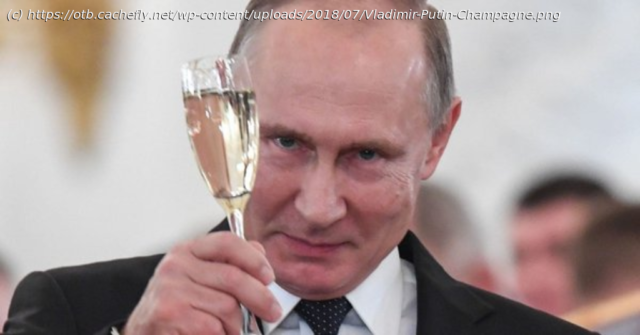A depressing magazine piece argues it is.
I had Anne Applebaum ‘s Atlantic feature “ THE BAD GUYS ARE WINNING ” (less childishly, “ The Autocrats Are Winning ” in the URL) on my reading backburner because it’s long, ponderous, and depressing. Given her neocon tendencies and marriage to a Polish politician, the subhed, “ If the 20th century was the story of slow, uneven progress toward the victory of liberal democracy over other ideologies—communism, fascism, virulent nationalism—the 21st century is, so far, a story of the reverse” comes across as bought overwrought and self-serving. After a painfully long anecdote about a probably-stolen election in faux-democratic Belarus, she declares, Both also learned lessons from the Arab Spring, as well as from the more distant memory of 1989, when Communist dictatorships fell like dominoes: Democratic revolutions are contagious. If you can stamp them out in one country, you might prevent them from starting in others. The anti-corruption, prodemocracy demonstrations of 2014 in Ukraine, which resulted in the overthrow of President Viktor Yanukovych’s government, reinforced this fear of democratic contagion. Putin was enraged by those protests, not least because of the precedent they set. After all, if Ukrainians could get rid of their corrupt dictator, why wouldn’t Russians want to do the same? Lukashenko gladly accepted Russian help, turned against his people, and transformed himself from an autocratic, patriarchal grandfather—a kind of national collective-farm boss—into a tyrant who revels in cruelty. Reassured by Putin’s support, he began breaking new ground. Not just selective arrests—a year later, human-rights activists say that more than 800 political prisoners remain in jail —but torture. Not just torture but rape. Not just torture and rape but kidnapping and, quite possibly, murder. Lukashenko’s sneering defiance of the rule of law—he issues stony-faced denials of the existence of political repression in his country—and of anything resembling decency spread beyond his borders. In May 2021, Belarusian air traffic control forced an Irish-owned Ryanair passenger plane to land in Minsk so that one of the passengers, Roman Protasevich, a young dissident living in exile, could be arrested; he later made public confessions on television that appeared to be coerced. In August, another young dissident living in exile, Vitaly Shishov, was found hanged in a Kyiv park. At about the same time, Lukashenko’s regime set out to destabilize its EU neighbors by forcing streams of refugees across their borders: Belarus lured Afghan and Iraqi refugees to Minsk with a proffer of tourist visas, then escorted them to the borders of Lithuania, Latvia, and Poland and forced them at gunpoint to cross, illegally. Lukashenko began to act, in other words, as if he were untouchable, both at home and abroad. He began breaking not only the laws and customs of his own country, but also the laws and customs of other countries, and of the international community— laws regarding air traffic control, homicide, borders. None of this is the least bit surprising to anyone paying much attention to the region. Lukashenko is a thug and he gets support from Putin, who is an even bigger thug. Water is wet. The exiled opposition politician is charming and well-connected, however. Tsikhanouskaya has on her side the combined narrative power of what we used to call the free world. She has the language of human rights, democracy, and justice. She has the NGOs and human-rights organizations that work inside the United Nations and other international institutions to put pressure on autocratic regimes. She has the support of people around the world who still fervently believe that politics can be made more civilized, more rational, more humane, who can see in her an authentic representative of that cause. But will that be enough? A lot depends on the answer. We know the answer. And that answer is No. Not because the free world doesn’t care about democracy but because it doesn’t care enough to, say, start World War III over the conditions in Russia’s near abroad. The West has imposed all manner of sanctions against Putin and his cronies but, at the end of the day, only care so much. Regardless, this insight is interesting: All of us have in our minds a cartoon image of what an autocratic state looks like. There is a bad man at the top. He controls the police. The police threaten the people with violence. There are evil collaborators, and maybe some brave dissidents. But in the 21st century, that cartoon bears little resemblance to reality. Nowadays, autocracies are run not by one bad guy, but by sophisticated networks composed of kleptocratic financial structures, security services (military, police, paramilitary groups, surveillance), and professional propagandists. The members of these networks are connected not only within a given country, but among many countries. The corrupt, state-controlled companies in one dictatorship do business with corrupt, state-controlled companies in another. The police in one country can arm, equip, and train the police in another. The propagandists share resources—the troll farms that promote one dictator’s propaganda can also be used to promote the propaganda of another—and themes, pounding home the same messages about the weakness of democracy and the evil of America. This is not to say that there is some supersecret room where bad guys meet, as in a James Bond movie. Nor does the new autocratic alliance have a unifying ideology. Among modern autocrats are people who call themselves communists, nationalists, and theocrats. No one country leads this group. Washington likes to talk about Chinese influence, but what really bonds the members of this club is a common desire to preserve and enhance their personal power and wealth. Unlike military or political alliances from other times and places, the members of this group don’t operate like a bloc, but rather like an agglomeration of companies—call it Autocracy Inc. Their links are cemented not by ideals but by deals—deals designed to take the edge off Western economic boycotts, or to make them personally rich—which is why they can operate across geographical and historical lines. Now, this was largely true during the Cold War, with Moscow having all manner of mechanisms to bolster friendly autocrats. (The US and its allies did the same, too, of course, albeit mostly on a bilateral basis.) But, yes, networks are more sophisticated now and, yes, they work well to mitigate the effects of sanctions. Thus in theory, Belarus is an international pariah—Belarusian planes cannot land in Europe, many Belarusian goods cannot be sold in the U.S., Belarus’s shocking brutality has been criticized by many international institutions. But in practice, the country remains a respected member of Autocracy Inc. Despite Lukashenko’s flagrant flouting of international norms, despite his reaching across borders to break laws, Belarus remains the site of one of China’s largest overseas development projects. Iran has expanded its relationship with Belarus over the past year. Cuban officials have expressed their solidarity with Lukashenko at the UN, calling for an end to “foreign interference” in the country’s affairs. In theory, Venezuela, too, is an international pariah. Since 2008, the U.S. has repeatedly added more Venezuelans to personal-sanctions lists; since 2019, U.S. citizens and companies have been forbidden to do any business there. Canada, the EU, and many of Venezuela’s South American neighbors maintain sanctions on the country. And yet Nicolás Maduro’s regime receives loans as well as oil investment from Russia and China. Turkey facilitates the illicit Venezuelan gold trade. Cuba has long provided security advisers, as well as security technology, to the country’s rulers. The international narcotics trade keeps individual members of the regime well supplied with designer shoes and handbags. Leopoldo López, a onetime star of the opposition now living in exile in Spain, has observed that although Maduro’s opponents have received some foreign assistance, it’s “nothing comparable with what Maduro has received.” Like the Belarusian opposition, the Venezuelan opposition has charismatic leaders and dedicated grassroots activists who have persuaded millions of people to go out into the streets and protest. If their only enemy was the corrupt, bankrupt Venezuelan regime, they might win. But Lopez and his fellow dissidents are in fact fighting multiple autocrats, in multiple countries. Like so many other ordinary people propelled into politics by the experience of injustice—like Sviatlana and Siarhei Tsikhanouski in Belarus, like the leaders of the extraordinary Hong Kong protest movement, like the Cubans and the Iranians and the Burmese pushing for democracy in their countries—they are fighting against people who control state companies and can make investment decisions worth billions of dollars for purely political reasons. They are fighting against people who can buy sophisticated surveillance technology from China or bots from St. Petersburg.






